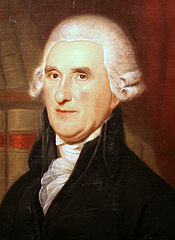Timothy Ruggles’s Challenge
One of the Stamp Act Congress’s first actions was to elect Timothy Ruggles as the presiding officer. People expected him to be more moderate than his fellow Massachusetts delegate, James Otis, Jr.
People also expected Ruggles to sign the public documents issued by that congress, along with clerk John Cotton. That was part of a convention chairman’s duties. (That’s why John Hancock’s name appeared on the first printed copies of the Declaration of Independence, and was so big on the calligraphic copy.)
But Ruggles refused to endorse the congress’s three petitions to the government in London, undercutting their legitimacy.
Otis argued with Ruggles, saying that the Massachusetts House had explicitly foreseen that the congress would prepare “a most loyal and dutiful address to his Majesty and his Parliament,” and “empowered [them] to sign and forward” such a document. It was important for the American colonies to show unity. But Ruggles insisted he wouldn’t sign.
In 1813, the Delaware delegate Thomas McKean (shown above more than twenty years later) told John Adams how heated the discussion had become:
In contrast, McKean was a thirty-one-year-old lawyer from Delaware, which barely qualified as a colony. (It was a three-county adjunct to Pennsylvania with a small separate legislature.) I can’t help but think that Ruggles would easily have brushed off whatever remarks the younger man had made. Almost five full decades later, however, there was no one left to contradict McKean’s dramatic version of events.
In any event, when the congress delegates gathered one last time on 25 October to sign the documents they had written together, Ruggles was already on his way home.
TOMORROW: The fallout in Massachusetts.
People also expected Ruggles to sign the public documents issued by that congress, along with clerk John Cotton. That was part of a convention chairman’s duties. (That’s why John Hancock’s name appeared on the first printed copies of the Declaration of Independence, and was so big on the calligraphic copy.)
But Ruggles refused to endorse the congress’s three petitions to the government in London, undercutting their legitimacy.
Otis argued with Ruggles, saying that the Massachusetts House had explicitly foreseen that the congress would prepare “a most loyal and dutiful address to his Majesty and his Parliament,” and “empowered [them] to sign and forward” such a document. It was important for the American colonies to show unity. But Ruggles insisted he wouldn’t sign.
In 1813, the Delaware delegate Thomas McKean (shown above more than twenty years later) told John Adams how heated the discussion had become:
…when the business was finished, our President would not sign the petitions, and peremptorily refused to assign any reasons, until I pressed him so hard that he at last said, “it was against his conscience,” on which word I rung the charge so loud, that a plain challenge was given by him and accepted, in the presence of the whole corps; but he departed the next morning before day without an adieu to any of his brethren.Did Ruggles really challenge McKean to a duel on 24 October and then leave town? Ruggles was fifty-four, a former speaker of the Massachusetts house, a militia general and war veteran. His standing as a gentleman was secure, and New England didn’t have a big tradition of dueling.
He seemed to accord with what was done during the session so fully and heartily, that Mr; Otis told me frequently it gave him surprize, as he confessed he suspected his sincerity.
In contrast, McKean was a thirty-one-year-old lawyer from Delaware, which barely qualified as a colony. (It was a three-county adjunct to Pennsylvania with a small separate legislature.) I can’t help but think that Ruggles would easily have brushed off whatever remarks the younger man had made. Almost five full decades later, however, there was no one left to contradict McKean’s dramatic version of events.
In any event, when the congress delegates gathered one last time on 25 October to sign the documents they had written together, Ruggles was already on his way home.
TOMORROW: The fallout in Massachusetts.


No comments:
Post a Comment